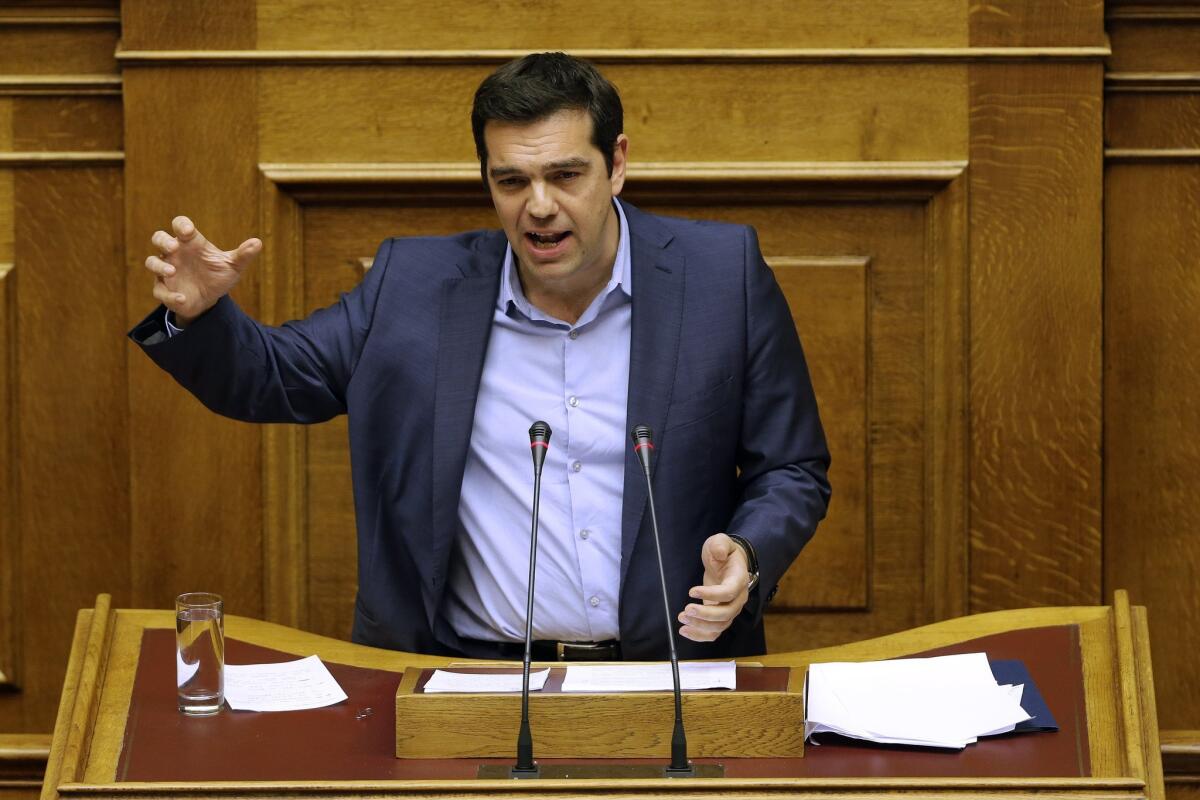Greece clears next hurdle to a bailout deal

Greek Prime Minister Alexis Tsipras speaks Thursday at an emergency Parliament session in Athens.
- Share via
Reporting from Athens — Greece cleared its second major legislative hurdle early Thursday in its quest for another multibillion-dollar bailout, overwhelmingly approving legal and banking reforms demanded by its international creditors.
Prime Minister Alexis Tsipras continued to face rebellion in the ranks of his left-wing Syriza party, from members who consider his acquiescence to lenders’ demands a betrayal of their principles. But he had no trouble securing enough votes in the Greek Parliament to pass the reform measure.
The vote came at 4 a.m., according to the Associated Press, following a grueling night of debate.
Significant dissent from within his party also marred last week’s parliamentary approval of pension cuts and tax increases. Then, Tsipras was forced to rely on support from opposition politicians to push the legislation through. The same occurred early Thursday with the new set of reforms, which focused on streamlining Greece’s sclerotic civil justice system and updating some banking regulations.
The various measures were set as prerequisites by Greece’s European partners for Athens to qualify for a new international bailout worth nearly $100 billion. With those conditions now fulfilled, negotiations on the precise terms of that rescue package are expected to begin in earnest.
The Greek government is in dire need of the money to pay its bills and to recapitalize its foundering banking system. An $8-billion emergency loan received Monday enabled it to pay a debt to the European Central Bank and to make good on two missed payments to the International Monetary Fund. But more repayments loom in mid-August, and Tsipras is hoping that a new bailout deal will be sealed by then, sparing Greece a catastrophic default and almost certain expulsion from the euro currency union.
Tsipras has reportedly taken a tougher line against party dissenters in recent days, telling them that they had yet to present him with any workable alternative to his agreement to the Eurozone’s demands and calling on those who want Greece to give up the euro to “come out and say it, instead of hiding behind the safety of my signature.”
Polls show that, despite now embracing policies that he won power explicitly campaigning against, Tsipras remains extremely popular among Greeks, many of whom say he had no choice and blame Greece’s lenders instead for acting punitively toward him.
But public support could quickly sour once new austerity measures start to be felt. A quarter of the workforce is out of a job, the economy has shrunk more than any other developed nation’s since the Great Depression, and even some officials in Germany, which has led the insistence on tough reforms, acknowledge that Greece is facing a humanitarian crisis.
To ease passage of the legal and financial reforms before Parliament, Tsipras decided to postpone more controversial legislation on further pension changes and agricultural taxes that Greece’s lenders have also demanded.
On Wednesday evening, thousands of protesters from a civil servants’ union and an anti-austerity group rallied outside Parliament against the bailout measures.
Inside, opponents took aim not at the specific reforms being put before them but at Tsipras’ adoption of the “neo-liberal” agenda of Athens’ creditors.
Panagiotis Lafazanis, the leader of Syriza’s hard-left faction and a Cabinet member until Tsipras sacked him for voting against last week’s pension and tax bill, told the Avgi newspaper that the government was making a mistake.
“We are doing an injustice to ourselves if we claim there is no alternative except austerity,” Lafazanis said. “Greece has no future as a country under the pressures of Eurozone austerity.”
Tsipras defended his course of action, telling Parliament early Thursday that “this struggle will not be in vain.”
“We chose a difficult compromise to avoid the worst plans of others,” Tsipras declared, apparently referring to some Eurozone officials who have publicly said that a Greek exit from the euro, or “Grexit,” would be preferable. “The deal gives us time to exclude a Grexit.”
There were reports Wednesday that the European Central Bank had decided again to increase its supply of emergency funds to Greek banks, which have nearly run out of cash. Last week, the central bank upped its emergency lifeline by nearly $1 billion; news reports said that its governing council had voted Wednesday to give another boost of the same amount.
Times staff writer Chu reported from London and special correspondent Tsiantar from Athens.
ALSO
Iran can deny access to military sites, foreign minister says
NSA leaker Edward Snowden seeks return to U.S., on his terms
Gov. Jerry Brown, at Vatican, tells mayors to ‘light a fire’ on climate change
More to Read
Sign up for Essential California
The most important California stories and recommendations in your inbox every morning.
You may occasionally receive promotional content from the Los Angeles Times.











